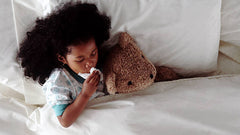Honey is a better bet for treating a child’s persistent night-time cough than over-the-counter medicine.
That’s what a number of general practitioners and medico’s have told the Australian Broadcasting Corporation (ABC) recently.
In an article published online in the ABC’s Life channel, Dr Ronald McCoy, from the Royal Australian College of General Practitioners (RACGP), said that “honey is preferred to over-the-counter cough suppressants to relieve symptoms of night-time coughing in a child over 12 months old with a cold.”
General practitioner Brian Morton told the ABC that trials have shown many over-the-counter treatments don't work and can also cause adverse reactions
Indeed evidence showing potential harm and lack of benefits has prompted Australia's medicines regulator, the Therapeutic Goods Association (TGA), to recommend children under six should not be given cough and cold medications sold over the counter.
For children aged between six and 11, the recommendation is to give the medications only on the advice of a medical practitioner.
Honey, however, has been shown to help young children with coughs and colds.
Dr Ronald McCoy, said that research shows a spoonful of honey every few hours can reduce irritation in young throats.
The ABC article also cited a 2014 US study as reporting that a “single dose of half a teaspoon of honey before bedtime diminished coughing and the discomfort experienced by children and their parents.”
Another scientific study showed that any one of three different honey varieties “was more effective at treating night-time coughing than a placebo.”
Paediatric respiratory and sleep specialist – Professor Anne Chang, told the ABC that it's unclear how effective honey is in terms of relieving coughs in adults.
But she said that so long as the person doesn't have other illnesses where they should be avoiding honey, such as diabetes, it won't hurt to try.
"An adult will require higher doses and increased frequency [so] I'd encourage using honey in lemon drinks, rather than taking spoonfuls of it."
Professor Chang said that whilst honey does contain microbial properties, those properties may not be primarily responsible for its effectiveness. Instead she said it's probably a combination of elements that make it effective.
"In addition to honey coating the throat and triggering the swallowing mechanism, its sweetness likely changes the sensitivity of sensory fibres," she says.
"There's an interaction between the sensory nerves locally and those in the central nervous system that are involved in the regulation of the mechanism of cough.
Of course not all types of honey will treat the infection that is causing the cough.
Only Manuka honeys are likely to do that because of their proven persistent ability to kill bacteria.
The article also warned against giving honey to babies under 12 months,
Dr Ronald McCoy, speaking on behalf of the RACGP, said that giving honey to young babies runs the the risk of the child getting infant botulism.
He said that infant botulism is extremely rare, but the child's immune system won't be developed enough [to fight it off]".
https://www.abc.net.au/life/is-spoonful-of-honey-best-thing-for-childs-cough/11043782
